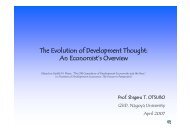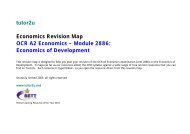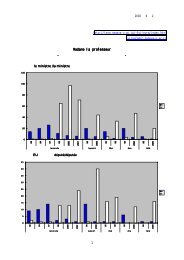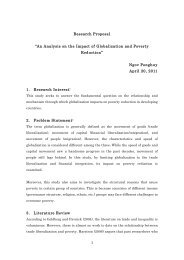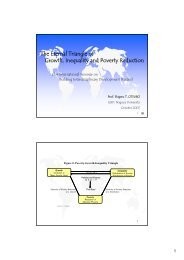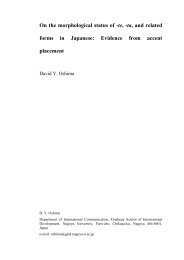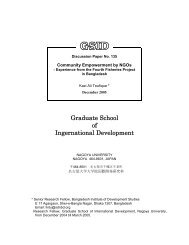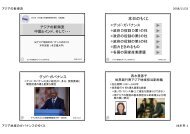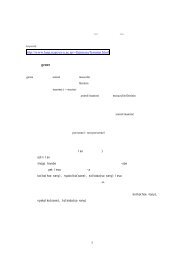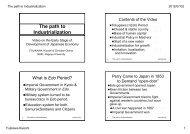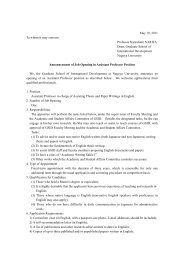Report
Report
Report
You also want an ePaper? Increase the reach of your titles
YUMPU automatically turns print PDFs into web optimized ePapers that Google loves.
H IGHER EDUCATION SERVICES 141<br />
benefit from a liberal FDI regime under the GATS given<br />
the vast gap between the demand for and supply of<br />
higher education. In addition, Pakistan ought to undertake<br />
sectoral commitments for the entry of teachers/<br />
researchers and other experts under Mode 4. Pakistan<br />
offers an important market for education in South Asia.<br />
Thousands of students leave Pakistan every year for<br />
study in foreign countries and hence a huge amount of<br />
foreign exchange is spent on the import of education<br />
by Pakistan. A lot of such amount could be saved if<br />
Pakistan encourages foreign institutions to open their<br />
branches in the country. Pakistan is also a market for<br />
import of education through Mode 1. Distance education<br />
is one example in this regard. Education via internet<br />
could be many times cheaper than the conventional<br />
mode and students are free from a number of associated<br />
problems such as hostel, library, etc. Mode 4 is another<br />
window through which Pakistan could gain immensely.<br />
Summary of Restrictions in the Sector<br />
• Foreign equity cap of 60% for commercial presence<br />
• No sectoral Mode 4 commitments<br />
• No national treatment with regard to subsidies<br />
• The minimum land and endowment requirements<br />
imposed to private educational institutions to<br />
establish a campus<br />
• Multiplicity of educational systems.<br />
Nepal<br />
Like Pakistan, Nepal has also undertaken commitments<br />
in all three sub-sectors of education services – higher<br />
education (CPC 923), adult education (CPC 924), and<br />
other education (CPC 929) – for which usually<br />
commitments are sought in the sector. Nepal has not<br />
inscribed any limitations under Modes 1 and 2 in the<br />
Market Access column and under Mode 3 access is<br />
subject to incorporation in Nepal with a maximum<br />
foreign equity ceiling of 51%. However, foreign equity<br />
participation will be increased to 80% after five years<br />
from the date of accession of Nepal and since Nepal<br />
would be completing five years of its accession in April<br />
2009 the ceiling of 51% would by then become a past<br />
restriction. Unlike other modes, Mode 4 is unbound<br />
and refers to the horizontal section where there does<br />
not seem to be any commitments for education services.<br />
Therefore, this mode, at best, is closed for the movement<br />
of teachers and other related professionals who can<br />
provide education services. In the National Treatment<br />
column while there are no limitations under Modes 1<br />
and 2, under Mode 3 national treatment has been<br />
accorded to foreign education providers and Mode 4<br />
is once again unbound except as in the horizontal<br />
section where too this mode remains unbound.<br />
In the horizontal section under Mode 3 in the<br />
Market Access column there is a provision stating that<br />
the conditions of ownership, operation and juridical<br />
form and scope of activity as set out in a license or<br />
other form of approval authorising the operation and<br />
supply of services by an existing foreign service supplier<br />
will not be made more restrictive than they existed as<br />
on the date of Nepal’s accession to WTO. This is a sort<br />
of assurance to those companies that were providing<br />
services prior to Nepal’s accession and the rules and<br />
regulations applied to them owing to Nepal joining<br />
WTO will not be more restrictive. Thus the rules and<br />
regulations, in a way, will be grandfathered and the<br />
interests of the concerned companies will be protected.<br />
The Mode 4 provisions as given in the horizontal<br />
section do not specifically apply to education services<br />
because the categories of persons allowed to enter Nepal<br />
to deliver services are service sales persons, persons<br />
responsible for setting up a commercial presence and<br />
ICTs. These categories of persons are primarily meant<br />
to cater to the needs of commercial presence.<br />
Under Mode 1 in the horizontal section, national<br />
treatment has not been accorded with respect to foreign<br />
exchange provided to foreigners to pay for any crossborder<br />
services. This may be considered a substantial<br />
barrier to the transaction of educational services via<br />
this mode. Unlike Mode 1, Mode 2 is without any<br />
limitations. However, there are quite a few limitations<br />
on Mode 3. The first is that a foreign investor<br />
reinvesting earnings is required to obtain the permission<br />
of the Department of Industry. The second limitation<br />
being that all foreign investments except financial<br />
services require approval of the Department of Industry.<br />
Finally, incentives and subsidies are available only to<br />
enterprises wholly owned by Nepalese nationals. Mode<br />
4 is unbound except for measures concerning the<br />
categories of natural persons referred to in the Market<br />
Access column which incidentally do not cover<br />
education services.<br />
In the education sector the gross enrollment ratio<br />
at the tertiary was only 9.7% in 2006 implying that<br />
Nepal requires substantial amount of investment in<br />
order to provide education to a larger number of<br />
students at this level (Summary Education Profile:<br />
Nepal, World Bank). Nepal is a labour-surplus country<br />
and exports unskilled, semi-skilled and highly skilled<br />
(e.g. engineers) labour to various labour-importing<br />
countries (UNCTAD-ICC 2003). This is so despite the




